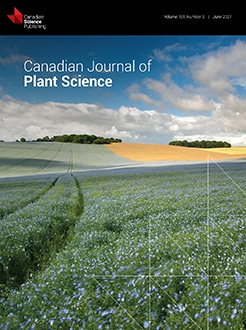Natural resistance-associated macrophage proteins (NRAMPs) are able to transport various metal ions across cell membranes, which play an important role in plant growth and development. Here, a survey of cucumber (Cucumis sativus L.) and watermelon [Citrullus lanatus (Thunb.) Matsum. & Nakai] genomes found a total of five CsNRAMPs and four ClNRAMPs, respectively. Based on the phylogenetic relationships, CsNRAMPs and ClNRAMPs were clustered into three groups (I, II, and III). Five orthologous pairs were identified between cucumber and watermelon genome, and they were clustered on the same branch of the phylogenetic tree. The number of introns in CsNRAMPs and ClNRAMPs ranged from 3 to 13 and the genes from group I were more fragmented than those in group II. Subsequently, analysis of promoter sequences found that five putative transcription factors could act on NRAMPs. Moreover, CsNRAMPs and ClNRAMPs were differentially regulated by deficiencies of iron (Fe), manganese (Mn), copper (Cu), or zinc (Zn), along with toxicities of Fe, Mn, Cu, Zn, or cadmium (Cd). Functional analysis by heterologous expression in yeast indicated that CsNRAMP4 and ClNRAMP3 participate in Cd transport. Overall, the comprehensive analysis of CsNRAMPs and ClNRAMPs reported herein may pave the way for further investigations examining the regulation and functions of this gene family in cucumber and watermelon.
BioOne.org will be down briefly for maintenance on 17 December 2024 between 18:00-22:00 Pacific Time US. We apologize for any inconvenience.
How to translate text using browser tools
8 December 2020
Genome-wide identification and expression analysis of NRAMP transporter genes in Cucumis sativus and Citrullus lanatus
Huanxin Zhang,
Guoquan Li,
Na Cao,
Huidong Yang,
Fanghong Zhu
ACCESS THE FULL ARTICLE
It is not available for individual sale.
This article is only available to subscribers.
It is not available for individual sale.
It is not available for individual sale.

Canadian Journal of Plant Science
Vol. 101 • No. 3
June 2021
Vol. 101 • No. 3
June 2021
Citrullus lanatus
Cucumis sativus
metal deficiency
metal toxicity
NRAMP




